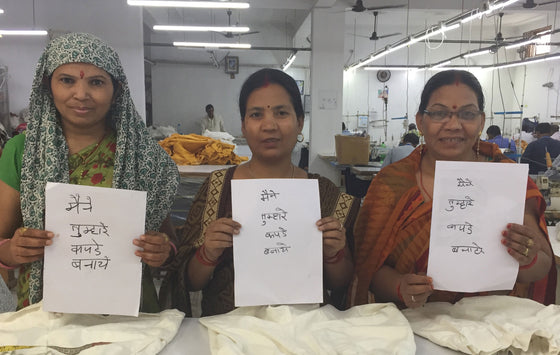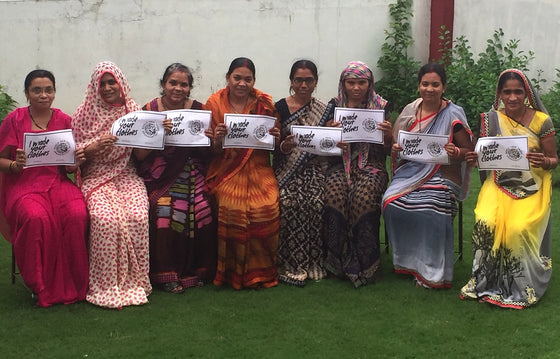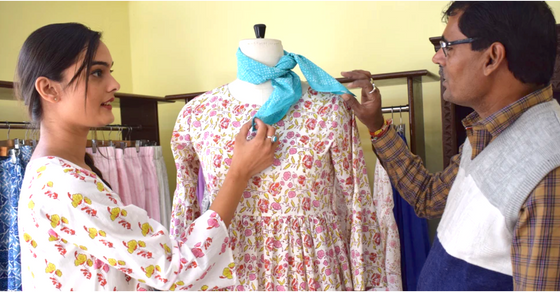Fashion Revolution - Transformation
April 19, 2020

Fashion Revolution Week is here. Fashion Revolution is a global compaign for clean, safe, fair, transparent and accountable fashion industry. To quote from the Fashion Revolution website, "We believe in a global fashion industry that conserves and restores the environment and values people over growth and profit."
From the current COVID -19 crisis, we can see that the garment industry is broken and the workers, who are at the bottom of the supply chain, experience crisis immediately due to the both the broken system and pandemic. There are no provisions made for them, by buyers, governments, customers, and often factory owners. These workers typically do not make a living wage due to the West’s hunger for cheap, fast fashion, so have no savings to fall back on. The crisis is now of epic proportions. Our consumption in the West and outsourcing of labor has led us to this perilous situation where supply chains are weak, lives are endangered and goods are not available.
Transparency, accountability, living wages, equitable working conditions
are among the many deep changes needed in the industry.
These changes are part of an integrated transformation.
What is our role in the revolution? Who are our employees?
While we are a US brand, we are also an Indian manufacturer. Mehera Shaw is unlike most other brands. We go beyond fair trade and ethical manufacture. We are not outsourcing. Our work is heavily focused on the manufacturing side of the supply chain. We own our factory in India 100% and are an Indian private limited company. We have committed to our supply chain, to the people who make our clothes and to finding on-the-ground solutions to the issues plaguing the garment industry.
We, as a company, have come together to work for the greater good. We work with our employees. They are part of the solution. We have worked to become guaranteed members of the WFTO so that our mission and standards are clear for us and our customers. Our employees have equally committed to the same vision and to working on toward the solution.
We started with a mission to be a force for good in the garment industry while making a top quality product. Starting a manufacturing company in India is a huge challenge. We didn’t start with outside funding. We started with a need to manufacture for our own brand and a conviction that we needed to ensure worker salaries were a living wage and paid on time and that we maintained fair trade working conditions. We guaranteed a living wage, on time salaries, safe workplace and no forced labor, no child labor. We learned on the job and alongside our employees. Together with our Jaipur team, we have built Mehera Shaw over many years from 10 people to over 40. We are proud of what we have achieved so far and are working every day to maintain and do better. 100% of our employees receive a living wage and are employed under fair trade labor standards. 95% of our employees now have bank accounts and pension funds. 100% of our employees receive a 13th month bonus. 95% of our employees have government health care. 100% of our employees keep their children in school and are eligible for micro loans for school fees, home improvement or health care.
There are no quick solutions or quick ways to get ahead. From the start, we have reinvested all profit into growing our company. We have gradually been able to grow and add to our manufacturing including adding a dyeing and block printing unit, water filtration, better equipment, a shop. We now manufacture for ethical brands around the world. Each advance has been hard won and won only through team effort. Everyone on our team is part of the solution each time we face a new issue.
We started this company with a false sense of confidence. After all we (my husband and I) had lived in India off and on for years. I spoke Hindi; he’d run a successful jewellery business from Jaipur for years. I’d worked with artisans in India over several research projects and knew block printing. We’d opened two shops in the US selling our eponymous brand which was manufactured by another company in Jaipur. So we felt we had a reasonable footing to start a manufacturing company in Jaipur, a reasonable understanding of the on-the-ground reality.
What we’ve learned since has been deeply humbling. I’ve come to understand more clearly the depth and interconnectedness of life, that each difficulty and challenge is related to so many other factors, that business is like a chess game of considering all factors and reactions, except the ‘factors’ aren’t chess pieces— they concern peoples’ lives. I’ve repeatedly had to step away from my assumptions as a Westerner and had to listen more carefully and understand more clearly a different context and different set of assumptions in order to make context appropriate decisions. Often this means I have had to pause to consider things, that I forget to consider—things that matter—weddings, festivals, family functions, weather, traffic, other parts of the supply chain. Context is everything. Every decision has an impact.
I’ve learned to write HR policy and discuss with our staff over each point to make sure it is context appropriate and also that it is always important to consider the specific moment, the specific person in each decision.
Fashion Revolution Week
We’ve participated in Fashion Revolution Week every year, feeling it was our duty to participate and call attention to the problems in the industry. The mission of Fashion Revolution is fundamentally important. The photos are one of the most profound ways to get people to wake up and actually see the people who make our clothes.
Every year in advance of Fashion Revolution Week, we take group photos and lots of individual photos of our staff holding ‘I made your clothes’ signs. When we first did this, even though we explained what the signs meant, no one really understood the underlying purpose and wondered why our customers wanted to see these photos. Now, over several years, our staff has a better understanding of the significance of the signs. They take a great deal of pride in holding up the signs and showing people who they are. When asked, they say that they take pride in the quality of their work and feel this shows customers respect their work. They take it as an honour and compliment that customers around the world want to see who they are.
Many of our well-meaning and supportive customers have requested more personal information about our employees during Fashion Revolution Week in an effort to help their end customers get to know the real people who ‘make their clothes.’ While we offer a few short bios of our staff, we generally don’t give out personal information out of respect for their privacy. We understand the desire to get to know the artisans who make our clothes. But we find that in the push to ‘do good,’ we also need to find a balance between bridging the gap and respecting privacy, between transparency, being visible and being placed ‘on display’.
We need to see garment industry workers as people and to put in place equitable working relationships. We need to push for artisans to become visible to the world, but we need a balance between seeing artisans as people first and remembering that they have private lives just like you and me. Seeing them is the first step to making policy that ensures equitable working conditions. Respecting worker rights is about the workplace and about them as private individuals.
Beyond photos
We hope that our discourse here provides some insight as to who our artisans are and how we see ourselves in the revolution.
Our artisan employees have wives, husbands, kids, siblings, parents. Some live in joint families with several generations. Some live in small family units. Some live a long way from work and take a train to the factory. Some live nearby and walk or ride a bus or a bicycle. Some have chronic health issues that plague them. Some have relatives who are chronically ill which causes them to miss work regularly or need flex time to get to the doctor. Some are in bad marriages and face abusive situations. Some were child brides and struggle with basic literacy and self confidence. Some have sons and daughters who are graduating from college. Some are college graduates. Some have decades of experience and brilliant skills. They are all people They all have a purpose and come to work ready to work and expect to be treated fairly.
We also share in each others’ lives as a family. Over the years we have gone to many, many weddings for the relatives, sons and daughters of our staff. We’ve gone to the hospital too. We advocated at the hospital when a stitcher’s son was hit by a truck and our staff members spent hours running to get medical supplies for his surgery. We helped when an employee’s wife was terribly injured in a road accident and needed months of physical therapy. We’ve collectively mourned the loss of family members, celebrated the graduations and marriages of sons and daughters. We’ve played Holi together, laughed together, worn silly birthday hats, eaten a lot of Rajasthani sweets and hung Diwali lights. The context of our various lives is different, but we are the same in our humanity. By working together, we bridge the gaps in our different circumstances and find solutions together.
Beyond awareness, next steps to an integrated transformation
As a company, in the workplace, we focus on the transparency and accountability issues. We focus on remaining true to our mission and improving our standards with every step. We consider each decision carefully—in the impact it will have on everyone and everything we are connected to. We regard this as our responsibility within the supply chain.
We haven’t ‘fixed’ the supply chain, but we make a difference for those with whom we work.
What is the long-term impact of our work for our employees?
The impact is measured in the small steps of everyday life. In brief: Living wages means being able to provide for one’s family, keep kids in school, plan for the future. A safe working environment and non-discrimination allows people to grow, to become more self-reliant, to learn new skills. Equitable labor standards allow people to help themselves. The impact reaches to their families.
This is a deep solution which takes time. It may take more than a generation. But when the next generation has higher literacy rates, less child marriage, better financial security and has a voice, there is positive change. When people have more agency over their own lives, they are part of the change. We are accountable to each other as human beings first, to treat each other with respect.
When companies have policies that are equitable and transparent, when they hold themselves accountable to the people with whom they work, then everyone is participating in the supply chain. There is a level of reciprocity which dignifies the work and creates a true exchange. Transformation comes about through an integrated whole—all the small steps and the individual standards of fair trade. We hold ourselves to this standard and it takes daily work to maintain. We also seek customers who share our values and mission so that they too, work with us.
We see customers as participants in this value chain. For the fast fashion supply chain, customers are buyers for whom money is the bottom line. When manufacturers desperately need money and are pushed past reasonable margins in terms of time and resources, the fall out is the workers. Big buyers must step up and work with their suppliers, support them, learn the on-the-ground issues and offer hand-in-hand support. There is no other way but to recognise we are in this together and all work together.
We believe this is the face of the revolution.
Leave a comment
Comments will be approved before showing up.








